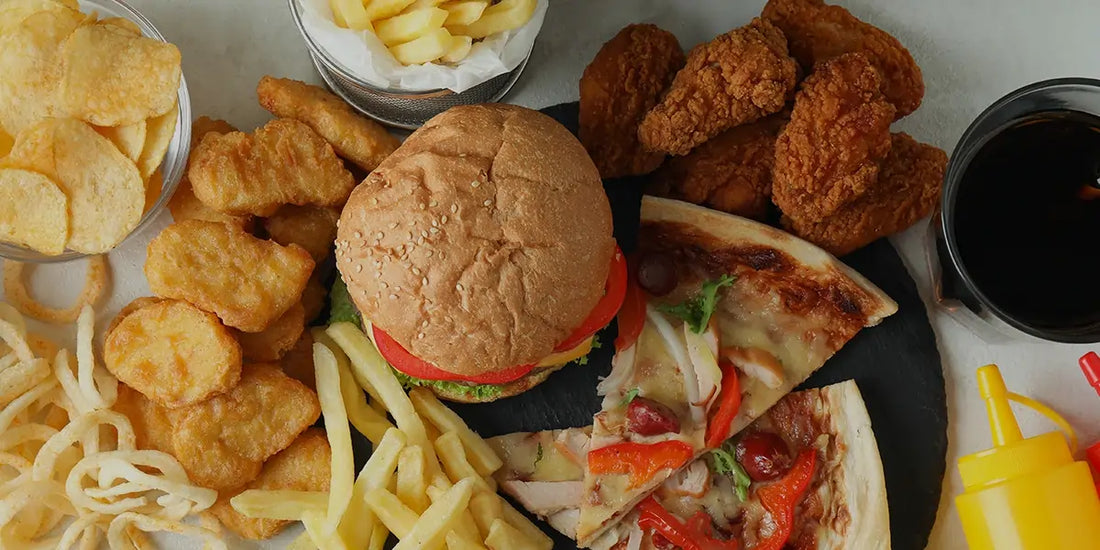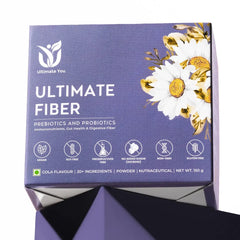Small shifts can lead to big gut gains. Explore what’s missing from your plate and take charge of your fiber intake with simple, smart fixes.
Fiber is one of the most overlooked nutrients, yet it plays a vital role in maintaining digestive health, preventing chronic diseases, and keeping our energy levels stable.
What is fiber and why is it important?
Fiber is a type of carbohydrate that your body cannot digest. It is essential for maintaining healthy digestion, preventing constipation, managing cholesterol levels, and supporting overall heart health. Fiber also helps regulate blood sugar and maintain a healthy weight.
According to the World Health Organization (WHO), most adults fall short of the recommended daily fiber intake, leading to a range of health issues, from digestive discomfort to increased risk of heart disease and diabetes.
If you’re struggling with bloating, fatigue, constipation, or even unintentional weight gain, the missing link could be fiber. Sadly, many of us don't get enough of it, and this is largely due to our diets, busy schedules, and lifestyle choices.
In fact, a study by the Centers for Disease Control and Prevention (CDC) revealed that only 5% of Americans consume the recommended amount of fiber each day.
This clearly shows that there is an urgent need to fulfill the nutritional gaps. However, it is important to understand the reasons why fiber might be missing from your diet and offer practical tips on how to improve your intake.
Let's discuss further!
1. You’re Not Eating Enough Whole Plant Foods
When it comes to fiber, the most natural and abundant sources are whole plant-based foods like fruits, vegetables, whole grains, legumes, and nuts. Unfortunately, many people today lean heavily on processed foods that lack fiber and essential nutrients.
Why does it matter?
Whole plant foods provide both soluble and insoluble fiber, which are essential for good digestion and overall health. Soluble fiber helps manage cholesterol levels, while insoluble fiber aids in moving food through the digestive system, reducing constipation.
How to fix it?
Add more plant-based foods to your meals. Aim for a variety of vegetables, fruits, beans, lentils, and whole grains like brown rice or quinoa. If you really want to give it a try, explore the high-fiber foods to help you get more fiber into your diet.
2. You Rely Too Much on Packaged “Healthy” Foods
It’s easy to assume that junk foods and packaged foods labeled as “high in fiber” actually meet your nutritional needs. However, many of these products are processed and often contain added sugars, preservatives, and minimal fiber compared to whole foods.
Why does it matter?
When packaged foods contain “added fiber,” it may not be the same as fiber found in whole, unprocessed foods. Whole foods come with extra vitamins, minerals, and antioxidants that enhance the fiber’s effectiveness. Many of these processed options provide a quick fix but don’t nourish your body as much as real food.
How to fix it?
When buying packaged foods, be mindful of the label. Look for products with at least 3 grams of fiber per serving and minimal added sugars. You can also try fiber-packed smoothies made from whole fruits and vegetables to make sure you’re getting fiber from the source.
3. Low-Carb or Keto Diets
Low-carb and keto diets have gained popularity for their potential weight-loss benefits, but they often drastically reduce or eliminate fiber-rich foods like beans, fruits, and whole grains.
Why does it matter?
Many of the foods you cut out on low-carb diets are packed with fiber, which can cause you to miss out on this important nutrient. Lack of fiber leads to digestive issues such as constipation and bloating.
How to fix it?
If you're on a low-carb or keto diet, you can still incorporate fiber-rich, low-carb foods like chia seeds, flaxseeds, leafy greens, and non-starchy vegetables. These can easily fit into your diet and help you meet your fiber needs without sacrificing your goals.
4. Skipping Breakfast
Many people skip breakfast due to time constraints, opting for quick, fiber-poor options like pastries, sugary cereals, or just a cup of coffee. While this may save time in the morning, it can leave you feeling sluggish and behind on your fiber intake.
Why does it matter?
Breakfast is the first opportunity to fuel your body for the day. By starting your day with a fiber-rich meal, you set yourself up for better digestion, sustained energy, and fewer cravings. Skipping this essential meal or opting for low-fiber choices can lead to digestive discomfort later.
How to fix it?
Try including fiber-rich foods in your breakfast. A bowl of oatmeal, whole-grain toast with avocado, or a smoothie with fruits and flaxseeds are great options. These foods will keep you full longer and provide the fiber your body needs.
5. You’re Not Drinking Enough Water
Water plays a key role in helping fiber move through your digestive system. If you’re not drinking enough water, fiber can actually cause discomfort, bloating, or constipation because it won’t be able to pass through the intestines smoothly.
Why does it matter?
Water helps fiber perform its job effectively by allowing it to expand and move through the gut properly. When fiber and water aren’t in balance, you may experience digestive discomfort, constipation, or sluggish digestion.
How to fix it?
Make it a point to drink at least 8 cups of water a day, especially when you increase your fiber intake. Hydration helps keep the digestive system running smoothly and maximizes fiber’s benefits.
In addition, you can start eating hydrating foods. It supports digestion by helping fiber move smoothly through the digestive tract, preventing bloating or constipation.
6. You Don’t Track Fiber Intake
Fiber is often overlooked in favor of counting calories, protein, or fats. However, without tracking fiber intake, it’s easy to miss the mark and end up with a diet that’s low in this vital nutrient.
Why does it matter?
The recommended daily intake of fiber is 25 grams for women and 38 grams for men. Many people unknowingly fall short of these targets, which results in fatigue, and an increased risk of chronic diseases like heart disease or type 2 diabetes.
How to fix it?
Track your fiber intake for a few days to get a sense of where you stand. Use a nutrition app to help identify the fiber gaps in your diet. Once you know where you're lacking, it’s easier to make adjustments.
One Stop Solution: Ultimate Fiber
Ultimate Fiber is a specially formulated fiber supplement that supports your digestive health with a unique blend of prebiotics and probiotics. Each pack contains 30 sachets, each with 5 grams of fiber, delivering a total of 150 grams of digestive support. This convenient and effective supplement helps with gut health, gastric problems, and blood sugar management.
The blend includes ingredients like Psyllium Husk, Chamomile, Kokum, Fennel Seeds, and a soothing Cola Flavor that makes it easy to integrate into your daily routine.
Why You’ll Love It?
- Travel-friendly
- Prebiotics and Probiotics for a healthy gut microbiome
- Helps with gastric problems and digestive issues
- Manages blood sugar levels effectively
- Reduces inflammation for overall health
- Delicious Cola flavor makes it enjoyable to consume
Moreover, Ultimate Fiber is free from added sugars, preservatives, and artificial fillers, providing a clean, effective solution for supporting your digestive system.
How To Consume?
Simply mix one sachet (5 grams) with water and enjoy the benefits of fiber in a delicious and easy-to-consume form.

Buy Now
Conclusion
On the whole, increasing your fiber intake is one of the simplest ways to improve your digestion, energy, and overall health. Whether you’re looking to reduce bloating, boost immunity, or maintain a healthy weight, fiber is a key ingredient in your nutrition plan.
By understanding the common reasons why fiber is missing from your diet, you can take actionable steps to ensure you’re getting enough of this important nutrient.
So, start by making small changes today. Add more fiber-rich foods to your meals, drink more water, and track your progress to see how much better you feel.
Remember, it’s not just about eating more fiber; it’s about eating the right kinds of fiber. Focus on whole foods, prioritize your hydration, and don’t forget to track your intake.
Disclaimer
The information provided is for educational purposes only and is not intended to be a substitute for medical treatment. If you're pregnant, nursing, taking medication, or have a medical condition, it's better to consult a healthcare professional. Ultimate You does not provide any guarantee regarding the accuracy, adequacy, completeness, legality, reliability, or usefulness of the information and disclaims any liability arising from it.

Ram Charan
Content Lead
With over 7 years of experience, he crafts engaging stories and compelling narratives. He believes crisp and engaging content adds value to customers and drives immense sales to businesses. When he's not working, you'll find him hanging out with friends, binge-watching movies, and exploring the world of organic foods.
Frequently Asked Questions
What are the different types of fiber?
There are two main types of fiber: soluble and insoluble. Soluble fiber dissolves in water and helps lower cholesterol, while insoluble fiber adds bulk to your stool and helps prevent constipation by speeding up digestion.
What are the best sources of fiber?
The best sources of fiber are fruits, vegetables, legumes (beans and lentils), whole grains (like oats, quinoa, and brown rice), nuts, seeds, and some high-fiber snacks. Including a variety of these in your diet will help you meet your fiber needs.
Can I get enough fiber from supplements?
While fiber supplements can help fill in the gaps when you're not getting enough fiber from food, they should not be your main source. Whole foods provide additional nutrients that supplements cannot replace, such as vitamins and minerals.
What happens if I don't get enough fiber?
Lack of fiber can contribute to weight gain, increase the risk of heart disease, and affect blood sugar levels, making conditions like diabetes harder to manage.
Can fiber help with weight loss?
Yes! Fiber-rich foods are often low in calories but high in volume, which helps you feel fuller longer. This can help control your appetite and prevent overeating, making it easier to maintain a healthy weight.
How long does it take for fiber to start improving my digestion?
It varies, but most people notice improvements in digestion within a few days to a week after increasing fiber intake.
- Choosing a selection results in a full page refresh.
- Opens in a new window.
15%

on your next order
By submitting your email address, you agree to receive marketing emails from Ultimate You at the email address provided. We may use information collected about you on our site to suggest the products and offers. you can withdraw your consent at any time by following the unsubscribe instructions in any email we send to you. view Terms and Privacy. Contact Ultimate Customer Care at #204-8430 Saint Monica Building, near Char Miner, Hyderabad, India, 203455.








